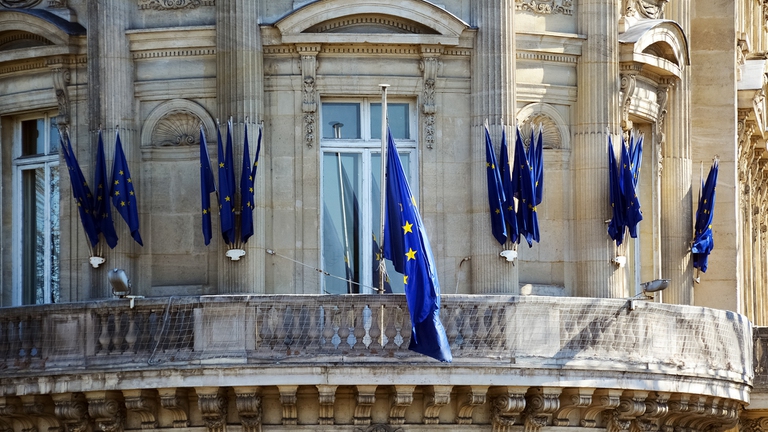https://www.lifegate.it/consumo-gas-taglio
- |
- The European Union has reached an agreement to reduce gas consumption until the end of March.
- The reduction will be 15 percent, but flexible and voluntary, except in emergencies.
- Italy, thanks to its flexibility, will be able to reduce consumption by as little as 7 percent.
The European Union has reached an agreement to reduce gas consumption between now and next spring, to cope with cuts in supplies from Russia following the conflict started by Moscow in Ukraine.THE Energy ministers of the 27 member countries, on Tuesday 26 July, they reached an almost unanimous agreement - Hungary was the only one not to approve it - on the basis of a proposal from the European Commission (to which some decisive modifications were made), which aims to reduce consumption up to a maximum of 15 percent, on a voluntary basis, in the period between 1 August and 31 March 2023.
With the approval of the new plan, all consumers - public administrations, families, owners of public buildings, electricity suppliers, industries - are called to take measures to save gas.In the meantime, the Commission is committed to accelerating measures to diversify supply sources, including through joint purchases, so that the Union can count on alternative suppliers.In the meantime, however, who gains and who loses from this agreement?

The key points of the agreement on the reduction of gas consumption
These are the details of the agreement reached on that basis by the energy ministers:
- Following complaints and criticism from some countries including Spain, Portugal, Poland, a flexibility of the objective was finally introduced, which will be modulated based on needs, the level of storage achieved by individual countries, and also the export capacity of any unused part of gas, according to a principle of solidarity:Italy, for example, by virtue of the progress already made in recent months, will have to reduce consumption by only 7 percent.
- The European Council (and not the Commission, as foreseen in the proposal) will also have the possibility to declare, after consulting the Member States, a state of "Union alarm" for reasons of security related to supply and to impose a mandatory reduction in gas demand, and further measures.The Union state of alarm may be triggered in the presence of a substantial risk of serious gas shortages or exceptionally high demand.
- By the end of September, Member States will have to update national emergency plans to define how they intend to achieve the reduction target, and report to the Commission every two months on the progress made in this direction.Member States requesting gas supplies invoking the principle of solidarity will be required to demonstrate what they have done to reduce internal demand.
As mentioned, there has been no shortage of controversy surrounding the agreement, accepted by many countries only after the introduction of that flexibility mechanism which, as mentioned, rewards Italy by virtue of the fact that Rome has already reached a capacity of 71% cent of gas storage:The Minister for the Ecological Transition Roberto Cingolani in fact, he explained that "it couldn't have gone better for us, considering that we have already planned a savings program equal to, if not higher than, 7 percent".
Spain's criticisms and Germany's role
The country that was most recalcitrant to the agreement, obviously apart from Viktor Orban's Hungary which defined it as "unfeasible", was Spain, to the point that theMinister for the Transition Teresa Ribera he stated clearly that "we were forced to say yes" to an agreement that "does not satisfy all those who would like the issue to have been addressed from their point of view too".The reference, not too veiled, to Germany, true inspiration of this agreement.
The one in Berlin is in fact the government most penalized by the energy crisis, given the strong dependence of the largest European economy on Russian gas:only for a few days, with the reopening of the Nord Stream I gas pipeline remained closed for twenty days, Germany has emerged from a critical phase which had led it, already in the summer, to have to resort to stored gas reserves, in a phase in which all the other countries are instead accumulating them in view of 'winter.Spain is also among the countries that will be able to reduce the reduction by a few points consumption.
However, based on the proposal of Commission President Ursula von der Leyen, Germany is advantaged by its geographical position and the presence of infrastructures that make it a potentially exporting country.
Ten years ago there was no solidarity during the financial crisis
In contrast to Spain and of Portugal which, due to infrastructural limitations and because they are connected to the western end of the continent, can in fact almost only receive gas.Ribera, as explained by El Pais, would have pointed out to the Commission that "it makes no sense that there are countries that reduce the demand for gas by 15 percent if they cannot then send what they have not consumed to other states of the Union, because the gas pipelines do not have capacity or because the receiving country does not have regasification plants to take the liquefied gas that is sent".The same concept of solidarity, the Spanish government also underlined, was not applied when ten years ago those who were in difficulty, in that case for financial reasons, were countries like Spain itself or the Greece.
Ursula von der Leyen commented on the agreement explaining that "by acting together to reduce gas demand, taking into account all relevant national specificities, the EU has ensured solid foundations for the indispensable solidarity among the member states in the face of Putin's energy blackmail".Just in time for Gazprom's announcement that it wanted to further reduce gas flows arriving from Russia to be welcomed with a pinch less concern.
